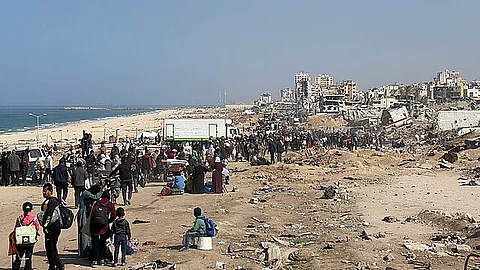

Palestinians observed Eid al-Adha in somber prayer beside bombed-out mosques and gravesites on Friday, as Israeli airstrikes killed at least 42 people across the enclave.
The attacks transformed the Festival of Sacrifice—traditionally marked by feasts and charity—into a day of mourning amid what the UN calls "unimaginable circumstances" of displacement and starvation.
Israeli forces launched concentrated attacks in Khan Younis, where shelling killed five members of one family preparing for Eid prayers. In northern Gaza, nine Palestinians died when residential homes in Jabalia were bombed, with casualties rushed to the overwhelmed Al-Ahli Baptist Hospital. Separate raids hit Gaza City’s Al-Tuffah neighborhood and a mobile charging station west of Khan Younis, killing four displaced civilians sheltering in tents.
For the fourth consecutive Eid under Israeli siege, celebrations were impossible. No fresh meat has entered Gaza for three months, and nearly all livestock have perished under bombardment. Families held prayers in rubble-strewn streets or visited cemeteries—one child was photographed swinging on a makeshift swing in a Khan Younis displacement camp. "This is how Eid looks here," said Al Jazeera’s correspondent from Deir al-Balah, describing a day of "grim remembrance''.
The U.S.-backed Gaza Humanitarian Foundation (GHF) shuttered all aid distribution points for the third straight day, citing "excessive crowding" and safety concerns. This follows earlier incidents where Israeli forces killed over 100 Palestinians near aid sites. The UN warns that Israel’s blockade has put all 2.3 million Gazans at risk of famine, with hospitals lacking even basic antibiotics and surgical tools.
Ahmed Qaljah, a journalist wounded in an Israeli strike on Al-Ahli Hospital, succumbed to his injuries—raising the total media worker deaths to 226 since the war began. Gaza’s Government Media Office condemned the "systematic targeting" of journalists and urged global press freedom groups to intervene.